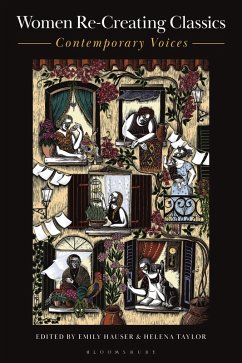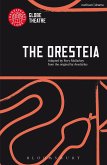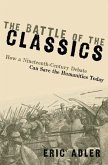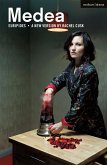Women Re-Creating Classics
Contemporary Voices
Herausgeber: Hauser, Emily; Taylor, Helena
Women Re-Creating Classics
Contemporary Voices
Herausgeber: Hauser, Emily; Taylor, Helena
- Broschiertes Buch
- Merkliste
- Auf die Merkliste
- Bewerten Bewerten
- Teilen
- Produkt teilen
- Produkterinnerung
- Produkterinnerung
"Drawing together an interdisciplinary range of scholarly and creative voices, this volume looks at contemporary discussions surrounding women's engagement with the classical past. There is a discussion as to why classical creative retellings are so popular now, as well as considerations of what creativity can do to foster new ways of thinking and writing about classics, thus blurring the boundary between the creative and the critical. In particular, the contributors engage with debates on how to make classics more accessible through the medium of creative works, so that it is not just a discipline for the selective few"--…mehr
Andere Kunden interessierten sich auch für
![Women Creating Classics Women Creating Classics]() Women Creating Classics35,99 €
Women Creating Classics35,99 €![The Oresteia The Oresteia]() AeschylusThe Oresteia18,99 €
AeschylusThe Oresteia18,99 €![The Battle of the Classics The Battle of the Classics]() Eric Adler (Associate Professor of Associate Professor of ClassicsThe Battle of the Classics26,99 €
Eric Adler (Associate Professor of Associate Professor of ClassicsThe Battle of the Classics26,99 €![A Cultural History of Education in Antiquity A Cultural History of Education in Antiquity]() A Cultural History of Education in Antiquity36,99 €
A Cultural History of Education in Antiquity36,99 €![Oresteia Oresteia]() AeschylusOresteia15,99 €
AeschylusOresteia15,99 €![Medea Medea]() EuripidesMedea15,99 €
EuripidesMedea15,99 €![The Oresteia The Oresteia]() AeschylusThe Oresteia22,99 €
AeschylusThe Oresteia22,99 €-
-
-
"Drawing together an interdisciplinary range of scholarly and creative voices, this volume looks at contemporary discussions surrounding women's engagement with the classical past. There is a discussion as to why classical creative retellings are so popular now, as well as considerations of what creativity can do to foster new ways of thinking and writing about classics, thus blurring the boundary between the creative and the critical. In particular, the contributors engage with debates on how to make classics more accessible through the medium of creative works, so that it is not just a discipline for the selective few"--
Produktdetails
- Produktdetails
- Verlag: Bloomsbury Publishing PLC
- Seitenzahl: 344
- Erscheinungstermin: 10. Juli 2025
- Englisch
- Abmessung: 232mm x 154mm x 20mm
- Gewicht: 522g
- ISBN-13: 9781350445086
- ISBN-10: 1350445088
- Artikelnr.: 72183296
- Herstellerkennzeichnung
- Libri GmbH
- Europaallee 1
- 36244 Bad Hersfeld
- gpsr@libri.de
- Verlag: Bloomsbury Publishing PLC
- Seitenzahl: 344
- Erscheinungstermin: 10. Juli 2025
- Englisch
- Abmessung: 232mm x 154mm x 20mm
- Gewicht: 522g
- ISBN-13: 9781350445086
- ISBN-10: 1350445088
- Artikelnr.: 72183296
- Herstellerkennzeichnung
- Libri GmbH
- Europaallee 1
- 36244 Bad Hersfeld
- gpsr@libri.de
Emily Hauser is Senior Lecturer in Classics and Ancient History at the University of Exeter, UK. She is author of Mythica: A New History of Homer's World, Through the Women Written Out of It (2025), How Women Became Poets (2023) and For the Most Beautiful (2016). She is co-editor of Reading Poetry, Writing Genre (2018). Helena Taylor is Associate Professor of French and Comparative Literature at the University of Exeter, UK. She is author of Women Writing Antiquity: Gender and Learning in Early Modern France (2024) and The Lives of Ovid in Seventeenth-Century French Culture (2017). She is co-editor of Ovid in French: Reception by Women from the Renaissance to the Present (2023) and Women and Querelles in Early Modern France (2021).
List of Figures List of Contributors Acknowledgments Introduction (Emily Hauser and Helena Taylor
Exeter University
UK) Creative Voices 1. Rewriting Greek Myth as a Woman (Emily Hauser
Exeter University
UK) 2. Classics and Craft (Madeline Miller
Independent Scholar
USA) 3. Return to the Labyrinth: Retelling the Stories of Mythical Women in Contemporary Poetry (Fiona Benson
Independent Scholar
UK) 4. Eurydice (Jennifer Saint
King's College London
UK) 5. Only Hope Remained (Rani Selvarajah
Independent Scholar
UK) 6. In the Bad Times (Cait Kremenstein
Independent Scholar
UK) 7. The Homeric Hymn to Dionysus (Roz Kaveney
Independent Scholar
UK) 8. Stage Manager's Notes (Gwyneth Lewis
Independent Scholar
UK) 9. Excerpt from Exit Kassandra (Carrie Etter
University of Bristol
UK) 10. a vespere nomen: An extract from patient zero (Kit Byford
Independent Scholar
UK) 11. The Real Sappho: Writing the Tenth Muse for the Contemporary Stage (Aimee Suzara
San Francisco State University and College of San Mateo
USA) 12. Suspended Animation: How the Fetish World Gave Life to Catullus and Callimachus (Isobel Williams
Independent Scholar
UK) 13. Transforming Voices: Ovid's Metamorphoses in Translation (Victoria Punch
Exeter University
UK) 14. Self-portrait in Egg (excerpt) (Jane Alison
University of Virginia
USA) 15. Declassifying Myself (Donna Zuckerberg
Independent Scholar
USA) Collaborations and Conversations 16. The Genesis and Creation of Dido/Elissa
a New Play by Magdalena Zira (Magdalena Zira
Independent Scholar
Cyprus; Edith Hall
Durham University
UK) 17. On Not Turning to Stone: Unstaging Women's Sexual Trauma in an Adaptation of the Myth of Medusa (Wendy Haines
Independent Scholar
UK; Christine Plastow
Open University
UK) 18. The Music of Homer: Anne Carson's TROYJAM (Yopie Prins
University of Michigan
USA; Anne Carson
Independent Scholar
Canada) 19. Contemporary Women Writers: On Creativity in Recreating the Classics (Clare Pollard and Carrie Etter
Independent Scholars
UK) 20. Interview with Gwyneth Lewis
by Polly Stoker (University of Winchester
UK) 21. Interview with Selby Wynn Schwartz
by Helena Taylor (University of Exeter
UK) 22. Interview with Ronni Kern
by Ruby Blondell (University of Washington
USA) 23. Interview with Roz Kaveney
by Jennifer Ingleheart (Durham University
UK) 24. Interview with Nikita Gill
by Emily Hauser (University of Exeter
UK) Creativity for the Future and Inclusive Classics 25. Students Shaping Classics: Non-traditional
Open Assessment
Creativity
Inclusivity and Shifting Disciplinary Boundaries (Helen Lovatt
University of Nottingham
UK) 26. Creative Teaching: Facing the Fear and Doing it Anyway (Sharon Marshall
University of Exeter
UK) 27. Imagining a World of Gods and Spirits Using Smells
Bells and More: A Creative Writing Workshop (Caroline Lawrence) 28. Breaking the Form: Women Writers across Creative and Critical Practice (Tom Geue
University of St. Andrews
UK; Emily Hauser
University of Exeter
UK; Daisy Dunn
Independent Scholar
UK) 29. Epilogue: No Going Back (Emily Greenwood
Harvard University
USA) Notes Bibliography Index
Exeter University
UK) Creative Voices 1. Rewriting Greek Myth as a Woman (Emily Hauser
Exeter University
UK) 2. Classics and Craft (Madeline Miller
Independent Scholar
USA) 3. Return to the Labyrinth: Retelling the Stories of Mythical Women in Contemporary Poetry (Fiona Benson
Independent Scholar
UK) 4. Eurydice (Jennifer Saint
King's College London
UK) 5. Only Hope Remained (Rani Selvarajah
Independent Scholar
UK) 6. In the Bad Times (Cait Kremenstein
Independent Scholar
UK) 7. The Homeric Hymn to Dionysus (Roz Kaveney
Independent Scholar
UK) 8. Stage Manager's Notes (Gwyneth Lewis
Independent Scholar
UK) 9. Excerpt from Exit Kassandra (Carrie Etter
University of Bristol
UK) 10. a vespere nomen: An extract from patient zero (Kit Byford
Independent Scholar
UK) 11. The Real Sappho: Writing the Tenth Muse for the Contemporary Stage (Aimee Suzara
San Francisco State University and College of San Mateo
USA) 12. Suspended Animation: How the Fetish World Gave Life to Catullus and Callimachus (Isobel Williams
Independent Scholar
UK) 13. Transforming Voices: Ovid's Metamorphoses in Translation (Victoria Punch
Exeter University
UK) 14. Self-portrait in Egg (excerpt) (Jane Alison
University of Virginia
USA) 15. Declassifying Myself (Donna Zuckerberg
Independent Scholar
USA) Collaborations and Conversations 16. The Genesis and Creation of Dido/Elissa
a New Play by Magdalena Zira (Magdalena Zira
Independent Scholar
Cyprus; Edith Hall
Durham University
UK) 17. On Not Turning to Stone: Unstaging Women's Sexual Trauma in an Adaptation of the Myth of Medusa (Wendy Haines
Independent Scholar
UK; Christine Plastow
Open University
UK) 18. The Music of Homer: Anne Carson's TROYJAM (Yopie Prins
University of Michigan
USA; Anne Carson
Independent Scholar
Canada) 19. Contemporary Women Writers: On Creativity in Recreating the Classics (Clare Pollard and Carrie Etter
Independent Scholars
UK) 20. Interview with Gwyneth Lewis
by Polly Stoker (University of Winchester
UK) 21. Interview with Selby Wynn Schwartz
by Helena Taylor (University of Exeter
UK) 22. Interview with Ronni Kern
by Ruby Blondell (University of Washington
USA) 23. Interview with Roz Kaveney
by Jennifer Ingleheart (Durham University
UK) 24. Interview with Nikita Gill
by Emily Hauser (University of Exeter
UK) Creativity for the Future and Inclusive Classics 25. Students Shaping Classics: Non-traditional
Open Assessment
Creativity
Inclusivity and Shifting Disciplinary Boundaries (Helen Lovatt
University of Nottingham
UK) 26. Creative Teaching: Facing the Fear and Doing it Anyway (Sharon Marshall
University of Exeter
UK) 27. Imagining a World of Gods and Spirits Using Smells
Bells and More: A Creative Writing Workshop (Caroline Lawrence) 28. Breaking the Form: Women Writers across Creative and Critical Practice (Tom Geue
University of St. Andrews
UK; Emily Hauser
University of Exeter
UK; Daisy Dunn
Independent Scholar
UK) 29. Epilogue: No Going Back (Emily Greenwood
Harvard University
USA) Notes Bibliography Index
List of Figures List of Contributors Acknowledgments Introduction (Emily Hauser and Helena Taylor
Exeter University
UK) Creative Voices 1. Rewriting Greek Myth as a Woman (Emily Hauser
Exeter University
UK) 2. Classics and Craft (Madeline Miller
Independent Scholar
USA) 3. Return to the Labyrinth: Retelling the Stories of Mythical Women in Contemporary Poetry (Fiona Benson
Independent Scholar
UK) 4. Eurydice (Jennifer Saint
King's College London
UK) 5. Only Hope Remained (Rani Selvarajah
Independent Scholar
UK) 6. In the Bad Times (Cait Kremenstein
Independent Scholar
UK) 7. The Homeric Hymn to Dionysus (Roz Kaveney
Independent Scholar
UK) 8. Stage Manager's Notes (Gwyneth Lewis
Independent Scholar
UK) 9. Excerpt from Exit Kassandra (Carrie Etter
University of Bristol
UK) 10. a vespere nomen: An extract from patient zero (Kit Byford
Independent Scholar
UK) 11. The Real Sappho: Writing the Tenth Muse for the Contemporary Stage (Aimee Suzara
San Francisco State University and College of San Mateo
USA) 12. Suspended Animation: How the Fetish World Gave Life to Catullus and Callimachus (Isobel Williams
Independent Scholar
UK) 13. Transforming Voices: Ovid's Metamorphoses in Translation (Victoria Punch
Exeter University
UK) 14. Self-portrait in Egg (excerpt) (Jane Alison
University of Virginia
USA) 15. Declassifying Myself (Donna Zuckerberg
Independent Scholar
USA) Collaborations and Conversations 16. The Genesis and Creation of Dido/Elissa
a New Play by Magdalena Zira (Magdalena Zira
Independent Scholar
Cyprus; Edith Hall
Durham University
UK) 17. On Not Turning to Stone: Unstaging Women's Sexual Trauma in an Adaptation of the Myth of Medusa (Wendy Haines
Independent Scholar
UK; Christine Plastow
Open University
UK) 18. The Music of Homer: Anne Carson's TROYJAM (Yopie Prins
University of Michigan
USA; Anne Carson
Independent Scholar
Canada) 19. Contemporary Women Writers: On Creativity in Recreating the Classics (Clare Pollard and Carrie Etter
Independent Scholars
UK) 20. Interview with Gwyneth Lewis
by Polly Stoker (University of Winchester
UK) 21. Interview with Selby Wynn Schwartz
by Helena Taylor (University of Exeter
UK) 22. Interview with Ronni Kern
by Ruby Blondell (University of Washington
USA) 23. Interview with Roz Kaveney
by Jennifer Ingleheart (Durham University
UK) 24. Interview with Nikita Gill
by Emily Hauser (University of Exeter
UK) Creativity for the Future and Inclusive Classics 25. Students Shaping Classics: Non-traditional
Open Assessment
Creativity
Inclusivity and Shifting Disciplinary Boundaries (Helen Lovatt
University of Nottingham
UK) 26. Creative Teaching: Facing the Fear and Doing it Anyway (Sharon Marshall
University of Exeter
UK) 27. Imagining a World of Gods and Spirits Using Smells
Bells and More: A Creative Writing Workshop (Caroline Lawrence) 28. Breaking the Form: Women Writers across Creative and Critical Practice (Tom Geue
University of St. Andrews
UK; Emily Hauser
University of Exeter
UK; Daisy Dunn
Independent Scholar
UK) 29. Epilogue: No Going Back (Emily Greenwood
Harvard University
USA) Notes Bibliography Index
Exeter University
UK) Creative Voices 1. Rewriting Greek Myth as a Woman (Emily Hauser
Exeter University
UK) 2. Classics and Craft (Madeline Miller
Independent Scholar
USA) 3. Return to the Labyrinth: Retelling the Stories of Mythical Women in Contemporary Poetry (Fiona Benson
Independent Scholar
UK) 4. Eurydice (Jennifer Saint
King's College London
UK) 5. Only Hope Remained (Rani Selvarajah
Independent Scholar
UK) 6. In the Bad Times (Cait Kremenstein
Independent Scholar
UK) 7. The Homeric Hymn to Dionysus (Roz Kaveney
Independent Scholar
UK) 8. Stage Manager's Notes (Gwyneth Lewis
Independent Scholar
UK) 9. Excerpt from Exit Kassandra (Carrie Etter
University of Bristol
UK) 10. a vespere nomen: An extract from patient zero (Kit Byford
Independent Scholar
UK) 11. The Real Sappho: Writing the Tenth Muse for the Contemporary Stage (Aimee Suzara
San Francisco State University and College of San Mateo
USA) 12. Suspended Animation: How the Fetish World Gave Life to Catullus and Callimachus (Isobel Williams
Independent Scholar
UK) 13. Transforming Voices: Ovid's Metamorphoses in Translation (Victoria Punch
Exeter University
UK) 14. Self-portrait in Egg (excerpt) (Jane Alison
University of Virginia
USA) 15. Declassifying Myself (Donna Zuckerberg
Independent Scholar
USA) Collaborations and Conversations 16. The Genesis and Creation of Dido/Elissa
a New Play by Magdalena Zira (Magdalena Zira
Independent Scholar
Cyprus; Edith Hall
Durham University
UK) 17. On Not Turning to Stone: Unstaging Women's Sexual Trauma in an Adaptation of the Myth of Medusa (Wendy Haines
Independent Scholar
UK; Christine Plastow
Open University
UK) 18. The Music of Homer: Anne Carson's TROYJAM (Yopie Prins
University of Michigan
USA; Anne Carson
Independent Scholar
Canada) 19. Contemporary Women Writers: On Creativity in Recreating the Classics (Clare Pollard and Carrie Etter
Independent Scholars
UK) 20. Interview with Gwyneth Lewis
by Polly Stoker (University of Winchester
UK) 21. Interview with Selby Wynn Schwartz
by Helena Taylor (University of Exeter
UK) 22. Interview with Ronni Kern
by Ruby Blondell (University of Washington
USA) 23. Interview with Roz Kaveney
by Jennifer Ingleheart (Durham University
UK) 24. Interview with Nikita Gill
by Emily Hauser (University of Exeter
UK) Creativity for the Future and Inclusive Classics 25. Students Shaping Classics: Non-traditional
Open Assessment
Creativity
Inclusivity and Shifting Disciplinary Boundaries (Helen Lovatt
University of Nottingham
UK) 26. Creative Teaching: Facing the Fear and Doing it Anyway (Sharon Marshall
University of Exeter
UK) 27. Imagining a World of Gods and Spirits Using Smells
Bells and More: A Creative Writing Workshop (Caroline Lawrence) 28. Breaking the Form: Women Writers across Creative and Critical Practice (Tom Geue
University of St. Andrews
UK; Emily Hauser
University of Exeter
UK; Daisy Dunn
Independent Scholar
UK) 29. Epilogue: No Going Back (Emily Greenwood
Harvard University
USA) Notes Bibliography Index








